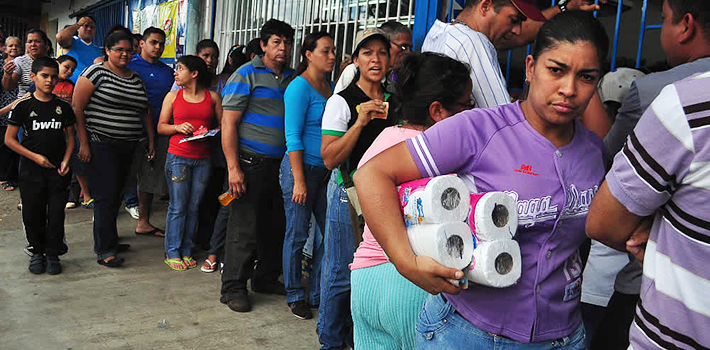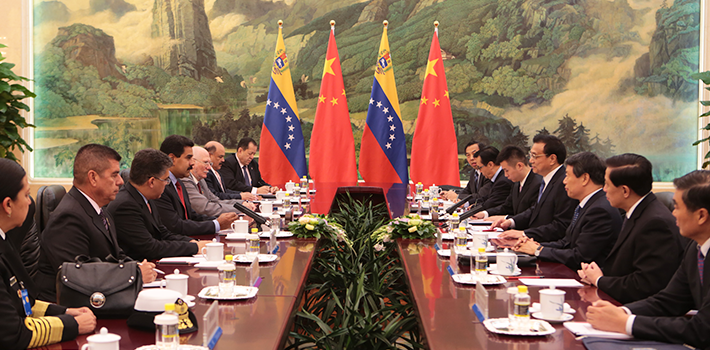EspañolTravelers returning to Venezuela from abroad bring toilet paper, corn flour, and sugar in their luggage, since finding these goods in Caracas and other cities involves a search worthy of a treasure hunt. In a country that once boasted Latin America’s largest and most modern supermarkets, long lines are now visible, as customers wait for the arrival of desperately needed milk.
Venezuela has long had an auto industry. GM established its first assembly plant there in 1948, and Ford’s operation is over 50 years old. Car production reached 400,000 units early in this century, while Venezuela once boasted Mercedes Benz’s only overseas assembly plant. Now plants are almost completely paralyzed, while drivers must queue for hours to purchase scarce car batteries.
That this is happening in a country that boasts a half trillion dollar economy, including US$100 billion of oil income — it is almost unbelievable. Venezuela is far from being a bankrupt economic irrelevance like Cuba, but it is fast on its way to suffering the same fate.
Late last year, Venezuelan President Nicolás Maduro told the world that his country was facing an “Economic War,” purportedly declared on the country by the United States and its “lackeys” in the Venezuelan private sector. He blamed merchants, bankers, and the business community in general for the country’s economic ills.

In truth, Venezuela is facing bankruptcy and chaos due to the biggest officially sanctioned looting of a country since Boris Yeltsin allowed the Russian oligarchs to steal that country’s assets.
Hugo Chávez sought to install a socialist command economy in Venezuela, continued under his successor: thousands of companies, farms, and cattle ranches were nationalized or simply confiscated without payment. The belief was that through this network of nationalized companies, goods could be offered more cheaply to the masses, without the private sector’s “enormous profits.”
The result, however, has been a dramatic fall in production and the collapse of these once prospering enterprises. Nationalized companies have been so badly run that they are now useful only for scrap metal.
In desperation, the government then established an elaborate network of state enterprises charged with importing goods that were formerly offered by the private sector. Now hundreds of political appointees are in charge of importing billions of dollars in goods that range from wheat and corn to cell phones, medical devices, and power plants.
The resulting corruption is probably breaking all records on the planet, even dwarfing the Russian episode. Since 2005, government agencies in Venezuela have purchased nearly $400 billion on imports at enormously inflated prices, and always with exorbitant commissions for well-connected middlemen. The officials that are fast becoming some of the world’s richest men enjoy the protection of the government, while their activities remain largely ignored by the same governments of developed nations that supposedly campaign to rid the world of corruption and money laundering.
To make matters worse, Venezuela has supplied oil at unbelievably low prices, with 30-year terms, to ideologically friendly countries in Central America and the Caribbean, including Cuba. Since 2004, this largesse has cost Venezuela $30 billion in lost income.
Moreover, the Chavistas have forgiven the debt of many of these countries. They allowed Jamaica to pay its debts by sending a few hundred English teachers for a spell in Venezuela, while Cuba has been paying its debts by sending Olympic sports coaches and economic advisers. No fiction writer could come up with a more fantastic tale! Truth is indeed stranger than fiction.
To cap all these actions towards economic suicide, the Chavistas have managed to devise the worst trade since Indians exchanged their gold for the hand mirrors offered by Spanish conquistadors.
Two years ago, Hugo Chávez announced triumphantly that China would be lending Venezuela $40 billion that would be paid with oil deliveries. A detailed analysis of the deal proved later how the Chinese took advantage of the Chavistas’ economic ignorance.
In truth, there was no loan. There was an initial short term advance that was paid by Venezuela within months. Since then, Venezuela has sent tens of billions of dollars worth of oil to China, while China provides guarantees for Venezuela’s imports to some suppliers. At any given time, the bookkeeping balance on the account is tens of billions in favor of Venezuela. Effectively, the Chinese are now getting part of their oil for free, while Venezuela has billions frozen in Chinese accounts.

The sheer stupidity, negligence, and outright corruption of these actions largely explains Venezuela’s current predicament. However, things are about to get worse.
Maduro — following the advice of his Cuban friends and a cabinet full of Marxist ideologues and economic charlatans — has decided that Venezuela’s current shortage of foreign exchange and the resulting scarcity in basic goods and inflation (the world’s highest in 2013) can be cured with further government controls on the private sector. He also wants to substitute private companies and their generations of specialist experience for new government agencies.
Unbelievably, despite the fact that nearly 70 percent of Venezuela’s foreign exchange is allocated to government agencies, Maduro truly believes that it is the private sector’s “economic war” that has caused the shortages.
In the meantime, the government has stopped foreign exchange allocations for companies that up until now have supplied the country or provided basic services. The government now owes billions of dollars to airlines that have sold tickets in Venezuela, while tens of billions are owed to companies for imports of raw materials and finished goods. Without an allocation of dollars by the government, many of these businesses have not been able to pay their suppliers, and thus have lost their credit lines.
In the last few days, the Venezuelan government has announced new regulations that will make it even harder for companies that are still in private hands to operate. A myriad of new procedures must be followed, with hundreds of new permits and regulations to be obtained before precious foreign exchange is allocated for new imports.
At the same time, Maduro’s rubber-stamp National Assembly approved the “Law of Costs, Prices and Profits,” with the declared intention of capping the profits of all companies in the country. One can imagine the laughter of economics professors everywhere at the mere mention of this law’s name.
Evidently, the result of all this folly will be ruin and chaos. It is only a question of time before the Venezuela economy implodes, and if the price of oil were to fall it is not unlikely that Venezuela would become a failed state — another example of another self-defined messiah trying to accomplish socialist paradise. It is unfortunate that inevitably some Venezuelans will perish as a result, and will join the millions who lost their lives in Lenin’s Russia and Mao’s China when their leaders tried these same ideas.
 Versión Español
Versión Español












